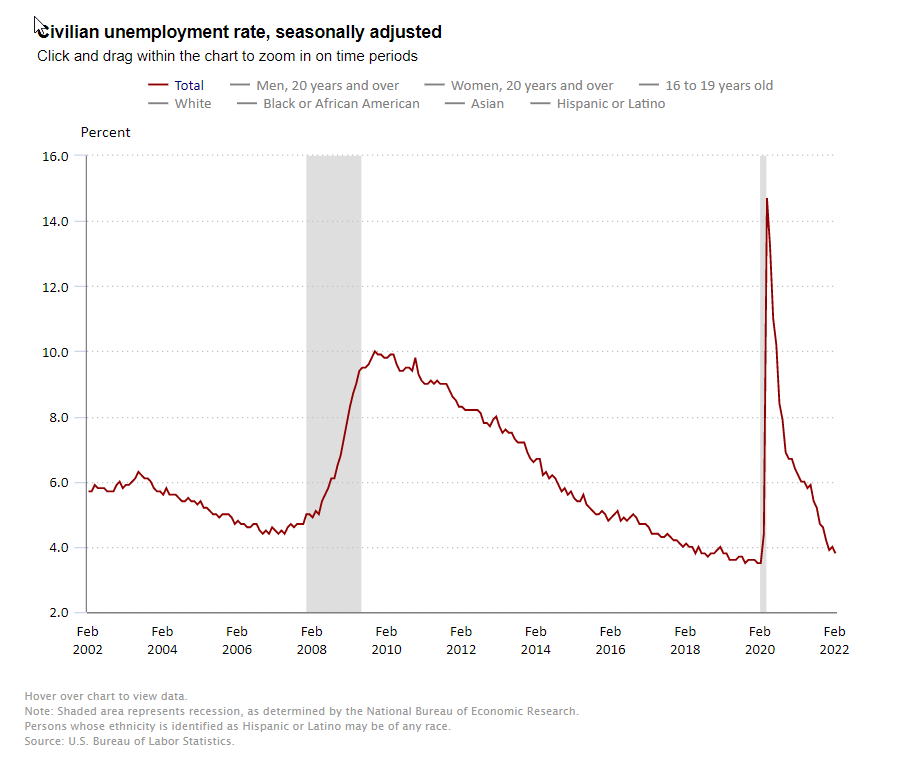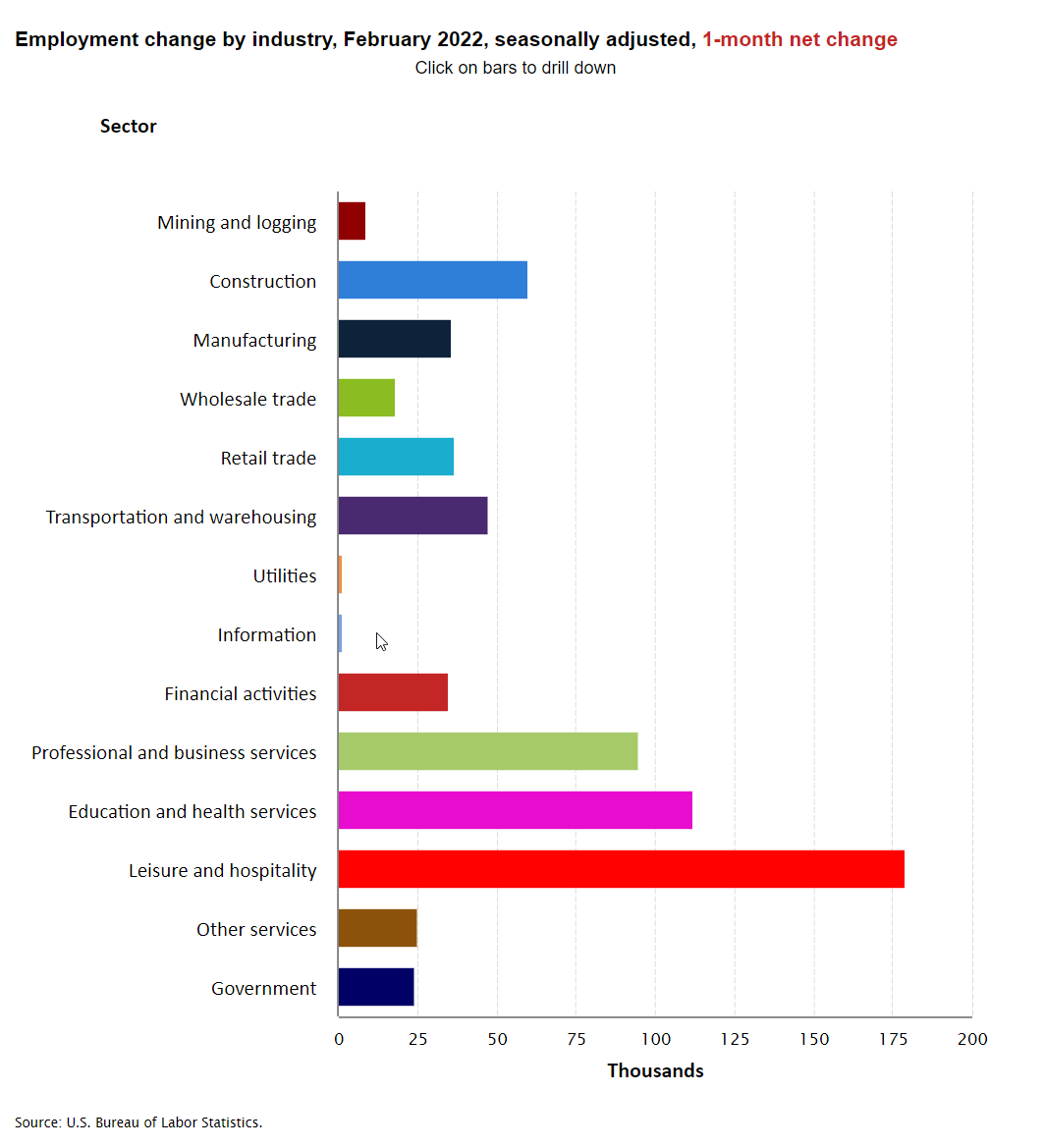The Labor Department reported that nonfarm payrolls rose by 678,000 in February 2022. This was stronger than market expectations of an increase of 423,000 and occurred despite the impact of omicron on the economy. Revisions added 92,000 to total payrolls in the previous two months. Nevertheless, nonfarm payrolls were still down by 2.1 million or 1.4% from their pre-pandemic level in February 2020.
Concerns about rising wage costs and inflation are further supported by this report. While average hourly earnings for all employees on private nonfarm payrolls rose by a mere $0.01 in February to $31.58, this was still a gain of 5.1% from year-earlier levels. This was less than the 5.7% rise seen in January, however.
February’s stellar job growth along with the year-over-year increase in wages will support the Federal Reserve’s intention of raising interest rates at its upcoming March meeting. Chair (pro tempore) Jerome Powell indicated in his congressional testimony this week that, with Russia's attacks on Ukraine roiling markets and creating additional uncertainty, he was inclined to support a 25-basis point hike later this month and that the Fed should “proceed cautiously” with plans to tighten policy this year.

In a separate survey conducted by the BLS, the jobless rate fell by 0.2 percentage point to 3.8% in February 2022. The jobless rate is now 0.3 percentage points above the pre-pandemic level of 3.5% seen in February 2020, and well below the 14.7% peak seen in April 2020. The number of persons unemployed edged down to 6.3 million but was still above the 5.7-million-person level seen prior to the pandemic.
The underemployment rate or the U-6 jobless rate was 7.2%, up from 7.1% in January 2022. This figure includes those who have quit looking for a job because they are discouraged about their prospects and people working part-time but desiring a full work week.
The labor force participation rate was unchanged at 62.3% in February but remained below the February 2020 level of 63.4%. The employment to population ratio was little changed at 59.9%, also below the February 2020 level of 61.2%. The report also showed that 13.0% of employed persons teleworked because of the pandemic, down from 15.4% in the prior month.

Employment in health care rose by 64,000 in February. Job gains occurred in home health care services (+20,000), offices of physicians (+15,000), and offices of other health practitioners (+12,000). Employment in health care was down by 306,000, or 1.9 percent, from its level in February 2020.
Separately and earlier in the week, the Department of Labor reported that initial jobless claims fell by 18,000 in the week ending February 26th, to 215,000. This was the lowest level since late last year and well below the 290,000 reading in mid-January. In another separate report, the JOLTS data release by the U.S. Bureau of Labor Statistics showed that job openings were little changed at 10.9 million on the last business day of December. Hires and total separations decreased to 6.3 million and 5.9 million, respectively. The layoffs and discharges level and rate were at series lows of 1.2 million and 0.8 percent, respectively.
The bottom line is that worker shortages are limiting layoffs.
About Beth Mace
Beth Burnham Mace is a special advisor to the National Investment Center for Seniors Housing & Care (NIC) focused exclusively on monitoring and reporting changes in capital markets impacting senior housing and care investments and operations. Mace served as Chief Economist and Director of Research and Analytics during her nine-year tenure on NIC’s leadership team. Before joining the NIC staff in 2014, Mace served on the NIC Board of Directors and chaired its Research Committee. She was also a director at AEW Capital Management and worked in the AEW Research Group for 17 years. Prior to joining AEW, Mace spent 10 years at Standard & Poor’s DRI/McGraw-Hill as director of its Regional Information Service. She also worked as a regional economist at Crocker Bank, and for the National Commission on Air Quality, the Brookings Institution, and Boston Edison. Mace is currently a member of the Institutional Real Estate Americas Editorial Advisory Board. In 2020, Mace was inducted into the McKnight’s Women of Distinction Hall of Honor. In 2014, she was appointed a fellow at the Homer Hoyt Institute and was awarded the title of a “Woman of Influence” in commercial real estate by Real Estate Forum Magazine and Globe Street. Mace earned an undergraduate degree from Mount Holyoke College and a master’s degree from the University of California. She also earned a Certified Business Economist™ designation from the National Association of Business Economists.
Connect with Beth Mace
Read More by Beth Mace